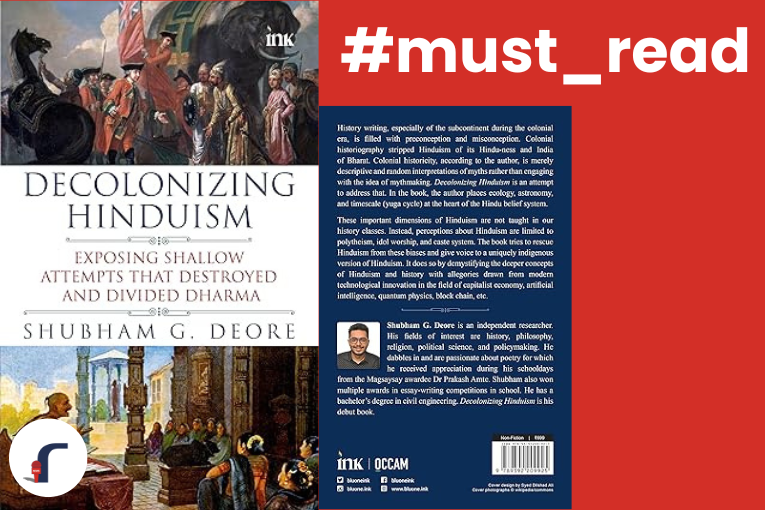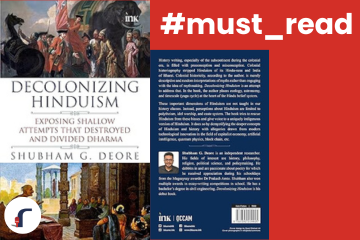Decolonizing Hinduism by Mr. Shubham Deore Review
Decolonizing Hinduism by Mr. Shubham Deore Review: Explore how this insightful book challenges misconceptions, decolonizes Hindu beliefs, and sheds light on the true essence of Hinduism.
HINDUTVA NEWS




In today's world, where historical narratives are often filtered through colonial lenses, it's crucial to revisit and reframe our understanding of our cultural heritage. Decolonizing Hinduism by Mr. Shubham Deore Review highlights how this compelling book urges readers to break free from the misconceptions and systematic distortions imposed upon Hinduism over the centuries. This insightful review explores the book’s emphasis on decolonizing not just historical events, but also the thought processes, beliefs, and perceptions surrounding Hinduism.
The Misinformation of "33 Koti" Explained
One of the book’s central themes is the misinterpretation of Hindu beliefs that has been perpetuated over time. A striking example of this is the widespread misunderstanding of the term "33 Koti Deva" in Hindu scripture. Many have been led to believe that "Koti" refers to 33 Crore (330 million) deities, a notion that paints Hinduism as overly complex and polytheistic to the uninformed observer. However, Mr. Deore clarifies that the word "Koti" in this context actually refers to 'types' or 'categories,' not a numerical value. The correct interpretation refers to the 33 types of deities in Hindu cosmology: Twelve Adityas, Eleven Rudras, and Eight Vasus, among others.
This seemingly small misinterpretation has had far-reaching consequences. The complexity and plurality of deities in Hinduism have often been misrepresented, suggesting that the religion lacks a singular divine identity. In contrast, Mr. Deore emphasizes that Hinduism also believes in one Paramatma, or Supreme Soul, which manifests in various forms. This understanding dismantles the notion that Hinduism is fragmented or inconsistent.
The Intent Behind the Misrepresentation
Mr. Deore goes beyond pointing out mistakes—he delves into the potential motives behind such misrepresentations. Was it merely a coincidence that such inaccuracies spread? Or was there a deliberate attempt to weaken the foundations of Hinduism? According to the author, this misinterpretation wasn’t just a mistake. It was part of a larger effort to mislead Hindus and to invite the younger generation into religions that claimed to be simpler and more straightforward in their concept of God. By portraying Hinduism as complicated and overwhelming, this misinformation sought to push people away from their indigenous beliefs.
The Ashoka Myth: Another Case of Distortion
Another significant example Deore discusses is the story of King Ashoka’s conversion to Buddhism after the Kalinga War. The commonly told narrative suggests that Hinduism's warrior ethos failed to resonate with Ashoka, prompting his conversion. However, Deore argues that the truth is far more complex. He points out that the type of Buddhism Ashoka propagated was not the same as the Buddhism we recognize today, and there are also debates about the timing of Ashoka’s conversion. Some historians suggest that he may have embraced Buddhism before the Kalinga War, rather than after it.
The propagation of such narratives, Deore contends, is another attempt to cast Hinduism in a negative light. By presenting Buddhism as a more compassionate alternative, these stories subtly undermine the richness and depth of Hinduism.
Why Decolonizing Hinduism Is a Must-Read
In today’s rapidly changing world, it’s vital for both current and future generations to decolonize their thinking and understand the true essence of Hinduism. Mr. Deore's book isn't just about reclaiming the past; it’s about reshaping the future. The systematic distortion of Hindu beliefs has led to a loss of confidence among its followers, and this book serves as a wake-up call to rediscover the beauty, complexity, and profound peace within Hinduism.
Mr. Shubham Deore describes his work as more of a responsibility than a passion project. As an aspirant for the UPSC Civil Services exam, he brings a rigorous academic approach to his writing. The extensive time he spent finalizing the draft reflects his dedication to providing evidence-backed claims. His proactive mindset and sense of accountability are evident throughout the book, making it not only an enlightening read but also a scholarly one.
A Call for Awareness and Support
Retrezar News highly recommends Decolonizing Hinduism for anyone looking to deepen their understanding of Hinduism and its decolonization. By supporting authors like Mr. Deore, we can encourage more voices to speak out against misinformation and help reclaim the true narrative of Hinduism.
If you’ve already read the book, we would love to hear your thoughts! Share your insights in the comments or subscribe to our newsletter for more discussions on this important topic.
In conclusion, Decolonizing Hinduism is not just a book—it’s a movement toward intellectual freedom. It encourages readers to question long-held beliefs and to understand the depth of their heritage. In a time where misinformation is rampant, works like this are essential for fostering awareness, self-reflection, and ultimately, a more accurate understanding of Hinduism.
Read Related Hindutva News
